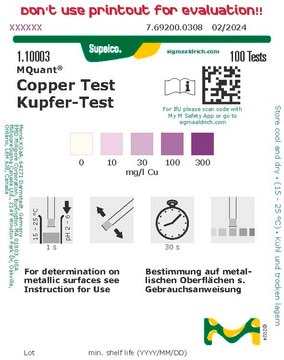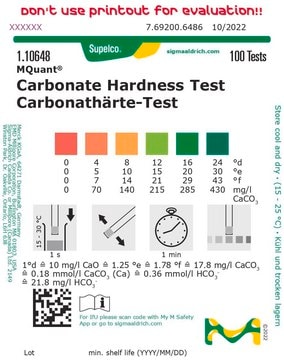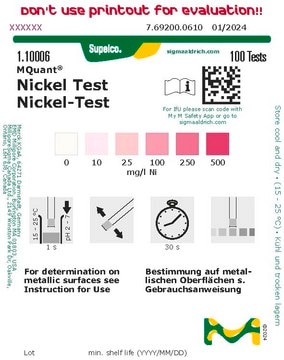1.10004
Iron Test Strips, colorimetric
3-500 mg/L (Fe²⁺), MQuant®
Synonym(s):
Iron chemical test strips
Sign Into View Organizational & Contract Pricing
All Photos(2)
About This Item
UNSPSC Code:
41116116
NACRES:
NA.24
Recommended Products
product name
Iron Test, colorimetric, 3-500 mg/L (Fe2+), MQuant®
description
semi-quantitative
Quality Level
product line
MQuant®
specific analyte(s)
iron
greener alternative product characteristics
Waste Prevention
Learn more about the Principles of Green Chemistry.
sustainability
Greener Alternative Product
measuring range
3-500 mg/L (Fe2+)
detection method
colorimetric
greener alternative category
storage temp.
15-25°C
General description
Method: Colorimetric, with test strips, 3 - 10 - 25 - 50 - 100 - 250 - 500 mg/L (Fe²+), MQuant®
The MQuant® test strips offer a very simple means of determining iron(II) in all aqueous media and on metal surfaces. They can thus be used to distinguish between ferrous and non-ferrous metals. Iron(II) ions react with 2,2′-bipyridine to form a red complex. The iron(II) concentration is measured semi-quantitatively by visual comparison of the reaction zone of the test strip with the fields of a color scale. For a determination of Fe(III) it is necessary to treat the sample with Ascorbic acid first, to reduce Fe(III) to Fe(II). The test strips are perfect for pre-testing a sample in an economic and quick way to estimate the iron concentration and a possible dilution factor prior to using a quantitative method such as a Reflectoquant® or Spectroquant® test.
We continue to demonstrate our commitment to our planet and a sustainable future by exploring ways to improve existing products in our portfolio. We have recently reviewed the current line of MQuant® test strips to identify key opportunities to minimize impact without compromising on the product performance.This product has benefited from:
The MQuant® test strips offer a very simple means of determining iron(II) in all aqueous media and on metal surfaces. They can thus be used to distinguish between ferrous and non-ferrous metals. Iron(II) ions react with 2,2′-bipyridine to form a red complex. The iron(II) concentration is measured semi-quantitatively by visual comparison of the reaction zone of the test strip with the fields of a color scale. For a determination of Fe(III) it is necessary to treat the sample with Ascorbic acid first, to reduce Fe(III) to Fe(II). The test strips are perfect for pre-testing a sample in an economic and quick way to estimate the iron concentration and a possible dilution factor prior to using a quantitative method such as a Reflectoquant® or Spectroquant® test.
We continue to demonstrate our commitment to our planet and a sustainable future by exploring ways to improve existing products in our portfolio. We have recently reviewed the current line of MQuant® test strips to identify key opportunities to minimize impact without compromising on the product performance.This product has benefited from:
- Test strip with reduction
- Recycled aluminum tube
- Digital instruction leaflet
Application
- Detection and evaluation of susceptibility to antibiotics in non-hydrogen sulfide-producing antibiotic-resistant soil microbe: Pseudomonas guariconensis.: This study focuses on detecting and evaluating the antibiotic resistance of Pseudomonas guariconensis, a soil microbe, using various susceptibility tests, including iron assays to understand its resistance mechanisms (Selvakumar et al., 2024).
- Genetic diversity and iron metabolism of Staphylococcus hominis isolates originating from bovine quarter milk, rectal feces, and teat apices.: The research explores the genetic diversity and iron metabolism pathways of Staphylococcus hominis isolates from different bovine sources, highlighting the role of iron assays in understanding bacterial physiology and resistance (Reydams et al., 2022).
- Anemia Prevalence, Type, and Associated Risks in a Cohort of 5.0 Million Insured Patients in the United States by Level of Kidney Function.: This large-scale study investigates anemia prevalence and types across varying levels of kidney function, utilizing iron tests to evaluate iron deficiency and its impact on health outcomes (Farrington et al., 2023).
- Influence of serum iron test results on the diagnosis of iron deficiency in children: a retrospective observational study.: This study examines how serum iron test results influence the diagnosis of iron deficiency in pediatric populations, emphasizing the importance of accurate iron testing in clinical diagnostics (Sezgin et al., 2021).
- Validation of magnetic resonance relaxometry R2 value and cyst fluid iron level for diagnosis of ovarian endometrioma.: The study validates the use of magnetic resonance relaxometry and iron level measurements in cyst fluid for diagnosing ovarian endometrioma, demonstrating the application of iron tests in medical imaging and diagnostics (Imanaka et al., 2021).
Linkage
Replaces: 10004-1; 10004
Legal Information
MQUANT is a registered trademark of Merck KGaA, Darmstadt, Germany
REFLECTOQUANT is a registered trademark of Merck KGaA, Darmstadt, Germany
SPECTROQUANT is a registered trademark of Merck KGaA, Darmstadt, Germany
Storage Class Code
11 - Combustible Solids
WGK
WGK 2
Certificates of Analysis (COA)
Search for Certificates of Analysis (COA) by entering the products Lot/Batch Number. Lot and Batch Numbers can be found on a product’s label following the words ‘Lot’ or ‘Batch’.
Already Own This Product?
Find documentation for the products that you have recently purchased in the Document Library.
Customers Also Viewed
Our team of scientists has experience in all areas of research including Life Science, Material Science, Chemical Synthesis, Chromatography, Analytical and many others.
Contact Technical Service












